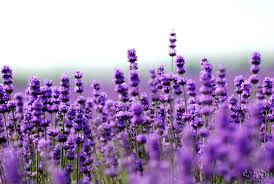lavender
英 ['lævəndə]
美 ['lævəndɚ]
- n. 薰衣草;淡紫色
- adj. 淡紫色的
- vt. 用熏衣草熏
- n. (Lavender)人名;(英)拉文德
lavender 薰衣草可能来自拉丁语lividus,蓝色,青紫色,词源同livid.或来自PIE*leu,冲洗,涌出,词源同lavatory,dilute,antediluvian.因这种花草用于洗手间的清香剂而得名。
- lavender (n.)
- "fragrant plant of the mint family," c. 1300, from Anglo-French lavendre, Old French lavendre, from Medieval Latin lavendula "lavender" (10c.), perhaps from Latin lividus "bluish, livid." Associated with French lavande, Italian lavanda "a washing" (from Latin lavare "to wash;" see lave) because it was used to scent washed fabrics and as a bath perfume. (An identical Middle English word meant "laundress, washerwoman;" also, apparently, "prostitute, whore; camp follower" and is attested as a surname from early 13c.). The adjective meaning "pale purple color" is from 1840.
- 1. All shades of mauve, lilac, lavender and purple were fashionable.
- 深深浅浅的各种木槿色、丁香色、熏衣草色和紫色都是流行色。
来自柯林斯例句
- 2. A trailing lavender negligee that swore at her bright red hair.
- 她身着拖地的淡紫色的长睡衣,与她那耀眼的红头发很不协调.
来自《简明英汉词典》
- 3. The fragrance of lavender filled the room.
- 房间里充满了薰衣草的香味.
来自《简明英汉词典》
- 4. The air was fragrant with lavender.
- 空气中弥漫薰衣草香.
来自《简明英汉词典》
- 5. Lavender thrives in poor soil.
- 薰衣草在贫瘠的土壤中茁壮生长。
来自辞典例句
[ lavender 造句 ]
